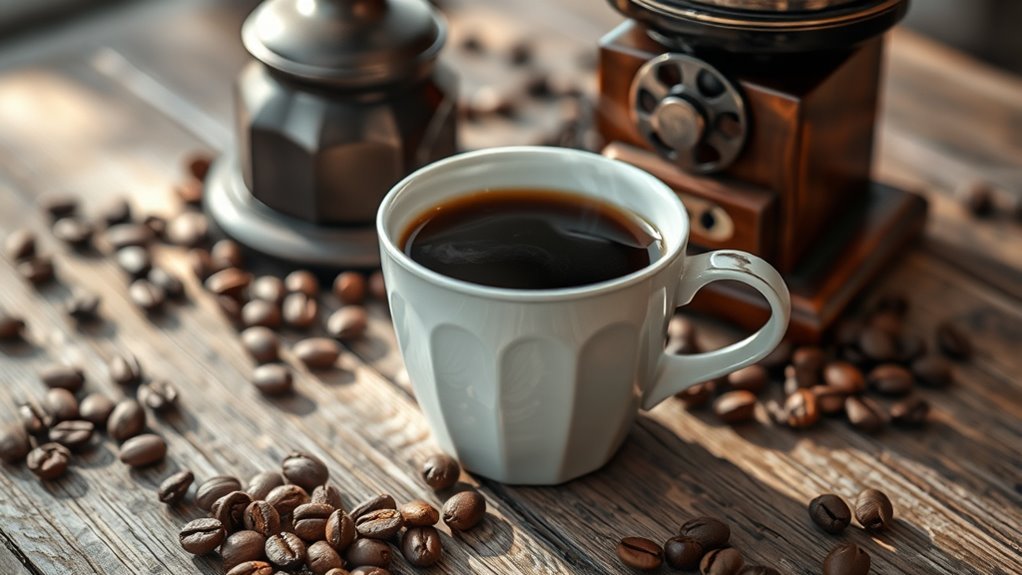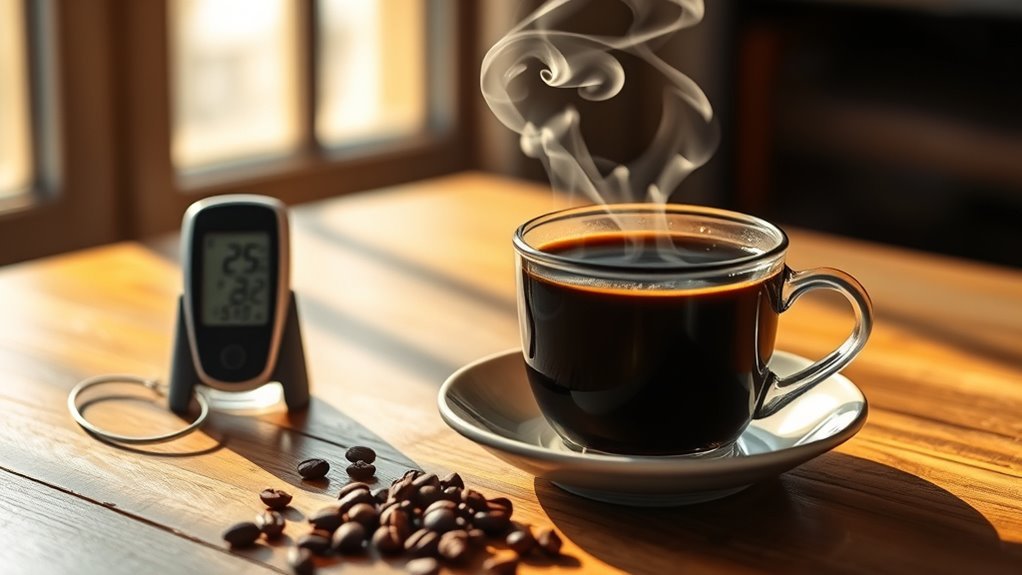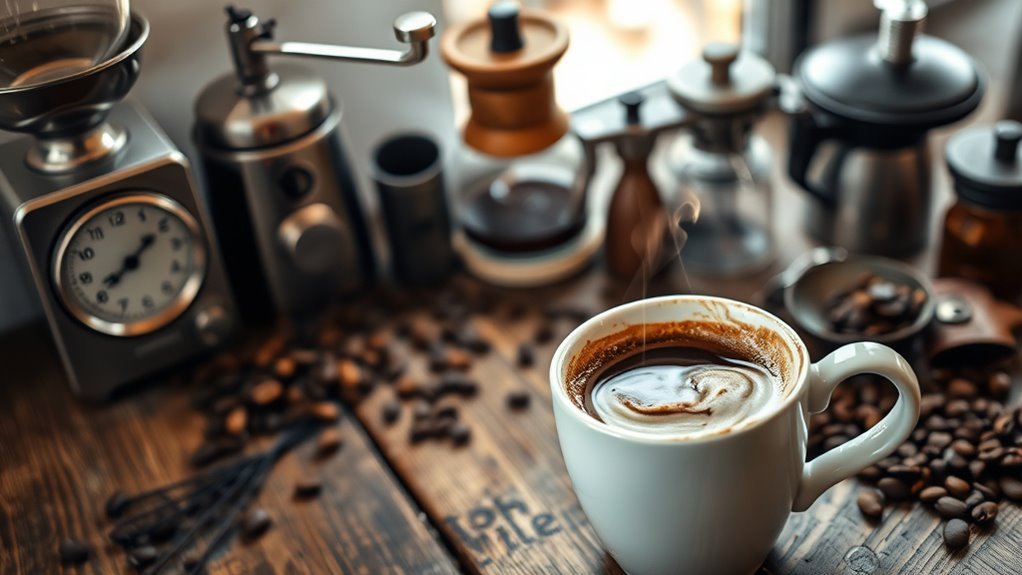Why Is My Coffee Bitter? (And How to Fix It)
Your coffee tastes bitter because it’s likely over-extracted, often caused by using too fine a grind, brewing with water that’s too hot, or stale beans. To fix this, try a coarser grind, brew at 195°F–205°F, reduce brewing time, and always use fresh, high-quality beans stored airtight. Adjusting the coffee-to-water ratio can also help balance flavors. Mastering these variables can transform your cup; exploring these techniques further will sharpen your brewing skills and improve taste.
Understanding the Causes of Bitter Coffee

Bitterness in coffee often stems from over-extraction, which happens when hot water pulls too many compounds from the coffee grounds. When this occurs, you lose the delicate coffee acidity that adds brightness and complexity. Instead, harsh, bitter tannins dominate, disrupting the flavor balance you’re aiming for. To regain control, adjust your grind size—finer grounds extract faster, increasing bitterness, so try a coarser grind. Also, monitor your brewing time; shorter brews preserve acidity and sweetness. Water temperature matters too; water that’s too hot accelerates extraction of bitter elements. By fine-tuning these variables, you can liberate your coffee’s natural flavors and achieve a harmonious balance, transforming your bitter brew into a smooth, vibrant cup that celebrates freedom in every sip.
The Impact of Coffee Bean Quality and Freshness
Although brewing technique plays an essential role, the quality and freshness of your coffee beans have an equally significant impact on the final taste, including bitterness. When you focus on bean selection, opt for high-quality, well-sourced beans that suit your flavor preference; poor-quality beans often carry harsh, bitter notes. Freshness significance can’t be overstated—coffee starts losing its desirable aromatic compounds soon after roasting. Using beans within two to three weeks of roasting guarantees you’re capturing peak flavor, minimizing bitterness caused by stale or oxidized coffee. Store your beans in an airtight container away from light and heat to preserve freshness. By prioritizing fresh, quality beans, you set a solid foundation for a smooth, balanced cup, giving you the freedom to explore brewing methods without battling unnecessary bitterness.
How Grind Size Affects Coffee Bitterness
When you adjust your grind size, you directly influence how quickly water extracts flavors from your coffee grounds. A finer grind increases the surface area, speeding up coffee extraction and often leading to over-extraction, which causes bitterness. Conversely, a coarser grind slows extraction, potentially resulting in under-extracted, sour flavors. To avoid bitterness, start by matching your grind size to your brewing method—espresso requires fine grounds, while French press needs coarse. If your coffee tastes bitter, try coarsening your grind slightly to reduce the extraction rate. Remember, even small grind adjustments can dramatically impact flavor balance. Experiment within these parameters to reclaim control over your brew, ensuring your coffee is as smooth and enjoyable as freedom itself.
Brewing Temperature and Its Role in Taste

Adjusting your grind size is just one part of controlling extraction; the temperature of the water you use also plays a significant role in shaping your coffee’s flavor profile. Brewing temperature directly affects flavor extraction—too hot, and you risk pulling bitter compounds; too cool, and your coffee may taste underdeveloped or sour. Aim for a water temperature between 195°F and 205°F (90°C–96°C) for ideal balance.
| Brewing Temperature | Effect on Flavor Extraction |
|---|---|
| Below 195°F (90°C) | Under-extraction, sourness |
| 195–205°F (90–96°C) | Ideal, balanced extraction |
| Above 205°F (96°C) | Over-extraction, bitterness |
Mastering brewing temperature empowers you to release your coffee’s full potential without bitterness.
Avoiding Over-Extraction During Brewing
To prevent over-extraction and bitterness, you need to carefully adjust your grind size, as too fine a grind extracts excessive bitter compounds. Controlling your brewing time is equally essential—extending it beyond ideal limits pulls unwanted flavors. Finally, monitor your water temperature closely; hotter water accelerates extraction and can quickly lead to harsh, bitter notes.
Grind Size Impact
Although grind size might seem like a minor detail, it plays an essential role in preventing over-extraction, which is a common cause of bitterness in coffee. When your grind is too fine, water extracts too many compounds, including bitter tannins, from the coffee grounds. To avoid this, you need to prioritize grind consistency and grind uniformity. Uneven particle sizes lead to uneven extraction, where finer particles over-extract and coarser ones under-extract, resulting in a bitter, unbalanced cup. Adjust your grinder to achieve a medium or coarser grind depending on your brewing method. Regularly calibrate your grinder to maintain uniform particle size, giving you greater control and freedom over extraction. Remember, dialing in the right grind size is your first defense against bitterness caused by over-extraction.
Brewing Time Control
One key factor in preventing bitterness is controlling your brewing time precisely. Over-extraction happens when coffee grounds steep too long, pulling out harsh compounds. Different brewing techniques and coffee equipment require tailored timing to avoid this. For example, espresso demands seconds, while a French press takes minutes. Adjust your timer based on grind size and method to maintain balance.
| Brewing Technique | Typical Time | Notes |
|---|---|---|
| Espresso | 25-30 seconds | Very short, intense |
| Pour Over | 2:30-3:30 minutes | Moderate, consistent flow |
| French Press | 4-5 minutes | Longer steep, coarse grind |
Master your timing, experiment with your equipment, and you’ll cut bitterness, revealing coffee’s true freedom.
Water Temperature Effects
While brewing time is critical, water temperature plays an equally essential role in preventing bitterness by controlling extraction rates. If your water temperature exceeds 205°F (96°C), it accelerates extraction, pulling out bitter compounds quickly. Conversely, water below 195°F (90°C) under-extracts, resulting in sour or weak coffee. For most brewing methods—whether pour-over, French press, or espresso—aim for a temperature between 195°F and 205°F to balance flavor extraction. Precision here grants you freedom to tailor your cup without bitterness. Use a thermometer or a temperature-controlled kettle to maintain consistency. Remember, adjusting water temperature allows you to fine-tune your brew’s profile, avoiding over-extraction and harsh flavors. Master this, and bitterness will no longer hold your coffee captive.
Selecting the Right Coffee-to-Water Ratio
When you’re aiming for a perfectly balanced cup, selecting the right coffee-to-water ratio is essential because it directly influences the extraction process and flavor profile. Too much coffee relative to water can make your brew bitter and overpowering, while too little results in weak, under-extracted coffee. Remember, coffee strength and water quality work hand-in-hand; even the best ratio won’t save poor water quality. Use this guide to dial in your preferred strength:
| Coffee (grams) | Water (ml) | Coffee Strength Level |
|---|---|---|
| 15 | 250 | Mild |
| 18 | 250 | Medium |
| 21 | 250 | Strong |
Experiment within this range to find your freedom in flavor without bitterness overpowering your cup.
Tips for Adjusting Your Brewing Method

To reduce bitterness, start by adjusting your grind size—finer grounds extract faster and can increase bitterness, while coarser grounds slow extraction. Next, control your water temperature, keeping it between 195°F and 205°F to avoid over-extraction. Finally, optimize your brew time to guarantee you’re not steeping too long, which can also intensify bitter flavors.
Grind Size Adjustment
Since grind size directly affects extraction, adjusting it is one of the most effective ways to control bitterness in your coffee. Start by evaluating your grind consistency—uneven particles cause over-extraction of fines and under-extraction of larger bits, leading to harsh flavors. If your coffee tastes overly bitter, try a coarser grind to reduce surface area and slow extraction. Conversely, if it’s weak or sour, a finer grind can help. Make small, incremental grind adjustments rather than large jumps; this precision lets you find the sweet spot where bitterness balances with flavor. Remember, your grinder’s settings might shift over time, so regularly check grind size and consistency. By mastering grind adjustment, you reclaim control over your brew, ensuring every cup matches your taste freedom perfectly.
Water Temperature Control
Although grind size plays a critical role, water temperature control is equally essential in preventing bitterness and achieving a balanced extraction. You want your brewing equipment to maintain water between 195°F and 205°F, as hotter water extracts harsh compounds causing bitterness. Also, water quality impacts taste; use filtered water to avoid off-flavors. Adjust your kettle’s temperature or let boiled water cool slightly before brewing to hit the sweet spot.
| Temperature (°F) | Effect on Taste | Action |
|---|---|---|
| Below 195 | Under-extraction | Increase temperature |
| 195-205 | Balanced extraction | Ideal range |
| Above 205 | Over-extraction | Lower temperature |
| Variable | Inconsistent flavor | Stabilize water temp |
Master this, and enjoy coffee freedom without bitterness.
Brew Time Optimization
When you fine-tune your brew time, you control how much flavor your coffee extracts, directly influencing bitterness and balance. Adjusting brew time is essential to mastering your preferred taste profile without over-extraction. Here’s how to optimize it using precise brewing techniques and coffee accessories:
- Shorten brew time to reduce bitterness caused by over-extraction.
- Lengthen brew time slightly if your coffee tastes sour or under-extracted.
- Use a timer or smart coffee accessories for consistent control.
- Experiment with grind size alongside brew time for ideal extraction.
Frequently Asked Questions
Can the Type of Water Affect Coffee Bitterness?
Did you know that 70% of your coffee’s taste comes from water composition? You can’t ignore the mineral content in your water—it dramatically influences bitterness. Hard water, rich in minerals like calcium and magnesium, can extract more bitter compounds. To control bitterness, try using filtered or bottled water with balanced mineral content. By adjusting your water, you gain freedom to fine-tune flavor and enjoy a smoother, less bitter cup every time.
Does Milk or Cream Reduce Coffee Bitterness?
Adding milk benefits your coffee by softening its bitterness through proteins that bind to bitter compounds, making your cup smoother and creamier. Cream effects go a step further by introducing more fat, which coats your tongue and masks bitterness even more effectively. So, if you want a less bitter, richer flavor, mixing in milk or cream is a smart move. Experiment to find the balance that frees your perfect taste.
How Does Coffee Storage Impact Bitterness Over Time?
Imagine you’re a Renaissance alchemist crafting your perfect brew. Your coffee’s freshness duration hinges on packaging quality—airtight, opaque containers shield beans from oxygen, light, and moisture, all culprits of bitterness over time. Storing beans improperly accelerates oxidation, breaking down delicate oils and causing harsh flavors. To preserve that freedom of flavor, keep your coffee sealed, cool, and away from sunlight. This way, you maintain a balanced, smooth cup every time.
Can Bitterness Be Caused by Dirty Coffee Equipment?
Absolutely, dirty equipment can cause bitterness in your coffee. Residual oils and old coffee grounds build up over time, turning rancid and imparting a harsh, bitter flavor. To avoid this, you should increase your cleaning frequency—ideally, clean your grinder and brewer after every use, and deep clean weekly. Staying consistent with cleaning keeps your equipment free from buildup, ensuring your coffee tastes fresh and liberates you from unwanted bitterness.
Does Altitude Affect Coffee Bitterness?
Imagine altitude as the invisible sculptor shaping your coffee’s soul. Higher elevations slow coffee cherry ripening, enhancing acidity and reducing bitterness. When selecting coffee origin, look for beans grown at higher altitudes for a brighter profile. Your brewing methods also matter—gentler techniques preserve these delicate flavors. So, if you crave freedom from bitterness, choose high-altitude beans and adjust your brewing approach to highlight their nuanced, vibrant character.






